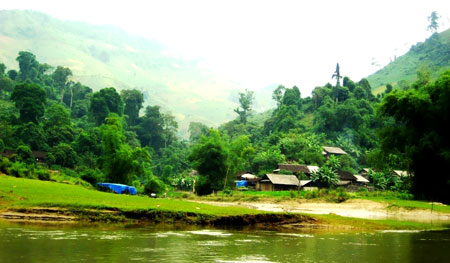We passed over 70 kilometers of steep roads from the town of Bac Kan to Pac Ngoi Village, in Nam Mau Commune, Ba Be District, Bac Kan Province and arrived at nightfall. Pac Ngoi Village continues to preserve its wilderness, but appeared boisterous due to the presence of a large number of domestic and foreign tourists.
 An old female friend of ours, and now a staff member of Bac Kan Province's Department of Culture, Sports and Tourism, arranged for us to stay in the The Sang Motel, one of the most beautiful stilt houses in Pac Ngoi, which was cleaner and tidier than we had imagined. It had a sign hanging outside written in both Vietnamese and English: Nha nghi - Guest house. The motel was divided into small rooms, with a central spacious area dedicated to collective activities available for groups of 20 to 40 tourists. The toilets and bathrooms were modern, yet had not destroyed the Tay ethnic people's traditional traits.
An old female friend of ours, and now a staff member of Bac Kan Province's Department of Culture, Sports and Tourism, arranged for us to stay in the The Sang Motel, one of the most beautiful stilt houses in Pac Ngoi, which was cleaner and tidier than we had imagined. It had a sign hanging outside written in both Vietnamese and English: Nha nghi - Guest house. The motel was divided into small rooms, with a central spacious area dedicated to collective activities available for groups of 20 to 40 tourists. The toilets and bathrooms were modern, yet had not destroyed the Tay ethnic people's traditional traits.
In a story punctuated by occasional visitors checking in for the night, The Sang Motel's owner Mrs. Sau said to us, "the villagers here hardly earned anything from farming and fishing. But a few years ago, they began to develop tourism and their lives have improved. Every household here that runs a home-stay can receive from 400-1,500 visitors per annum, making from tens to a hundred million VND. We invested about VND600 million in this motel in 2009 and have made money from catering and accommodation for tourists ever since."
Tourists to Pac Ngoi Village enjoy being involved in the everyday lives of the village's host families. They want to help harvest crops, weave cloth, pick vegetables, eat with their host family, and watch traditional Then singing, plus also visiting Ba Be Lake and the nearby Dao and Mong ethnic villages.
According to the village's chief Hua Van Canh, Pac Ngoi hosts 86 households, 11 of which provide home-stays for tourists. At first, they accepted passing tourists for fun, but then they decided to build motels and receive tourists as a way to make money. Many families have become better off through community-based tourism development and their constructions have partly changed the village's appearance. In addition to tourism development, Pac Ngoi villagers have also developed related trades including alcohol distillation and traditional cloth weaving.
Despite the greater integration via tourism development, the local traditional cultural traits are well maintained in Pac Ngoi, which is the most precious thing that Pac Ngoi villagers cherish.
We left Pac Ngoi at dawn and arrived in the city at sunset. In the noisy and hot city atmosphere, I suddenly recalled the peaceful and quiet nights in Pac Ngoi with its kindly villagers, and promised myself to return to Pac Ngoi another day.